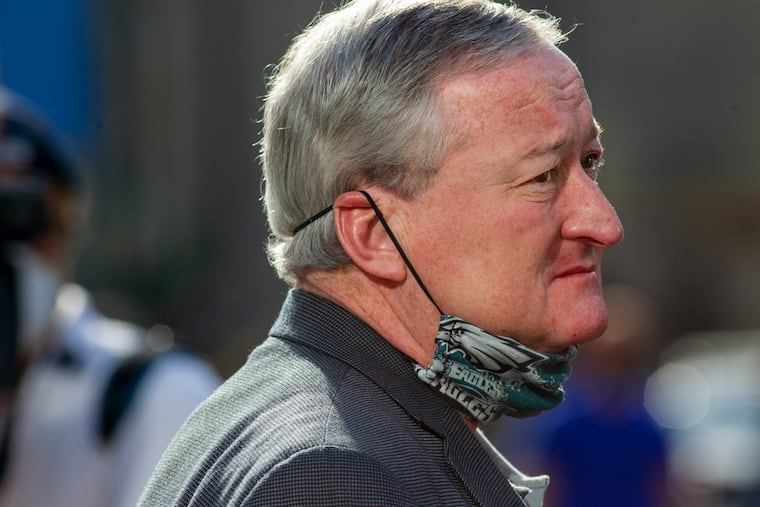Mayor Jim Kenney gave cops raises and shielded them from coronavirus layoffs. Protesters aren’t happy.
“Protests have changed the world,” Kenney said as he reconsiders his budget plan in light of protesters' demands. He had proposed a $19 million increase to the police budget as other departments face cuts.

Weeks after scrapping his proposed budget due to a $649 million shortfall caused by the coronavirus pandemic, Mayor Jim Kenney said Thursday that he is again reevaluating his spending plan for the next year in light of protests over George Floyd’s death.
The demonstrations have changed the political climate of cities across the country as protesters question funding for police. Philadelphia protesters have questioned whether Kenney is committed to police reform, pointing to his budget plan that calls for a $19 million increase in funding for police while significantly cutting other departments.
“Protests have changed the world,” Kenney said Thursday. “In the midst of all that’s going on, there’s some additional priorities being set.”
Kenney declined to provide details. He said he is negotiating with City Council, which must pass the budget for the next fiscal year by June 30.
» READ MORE: Philly plans to increase police funding while cutting city services. Critics say that’s a mistake.
But councilmembers — who had voiced concerns about some of Kenney’s proposed budget cuts even before the protests began — have their own ideas.
Councilmember Helen Gym said she was concerned about Kenney’s proposed increase in the Police Department budget, especially alongside planned cuts to the city’s investments in affordable housing and the Police Advisory Commission.
“I cannot approve a budget that increases funding for police and eviscerates funding for housing, and in particular, an increase in the policing budget that takes away from any of the reform efforts that people have been working on for a while,” Gym said.
Council President Darrell L. Clarke and four other members plan to unveil their own budget amendment Friday that will “invest $25 million as a first step toward addressing social ills and racial disparities laid bare by the COVID-19 pandemic and the civil unrest roiling the city and nation since the murder of George Floyd in Minneapolis,” according to a news release.
Councilmembers also vowed during their meeting Thursday to ask tough questions at the department’s budget hearing next week.
Among the significant cuts, Kenney has proposed effectively eliminating the Office of Workforce Development and the Office of Arts, Culture and the Creative Economy.
» READ MORE: Tax hikes, layoffs, and no swimming pools: Mayor Jim Kenney’s coronavirus budget isn’t pretty
The proposed bump for the Police Department is largely driven by 2.5% raises the mayor’s administration has given to officers as part of a one-year contract negotiated with the police union earlier this year. Kenney has said the city will not lay off police officers and firefighters during the pandemic, despite letting go of about 400 employees elsewhere in the government in belt-tightening necessitated by the coronavirus pandemic.
“The one thing we don’t want to see is laying off employees any more than we’re planning to do,” Kenney said Thursday when asked about calls to cut the police budget.
Despite the department’s overall increase, the revised proposal would cut the budget for the Police Advisory Commission, the official oversight body for the department, from $668,700 to $540,000. WHYY first reported the proposed cut to the commission, which protesters and lawmakers have contended should be strengthened and given additional funding.
» READ MORE: From Thursday: A sixth night of curfews
“Certainly oversight is really important for our Police Department going forward,” Managing Director Brian Abernathy said Thursday. “But again, we had to cut a lot of things that I think are really important.”
The union contract has also become a point of contention. In normal times, the administration would have spent the first half of this year working out four-year deals with each of the unions, using the incentive of increased compensation or benefits to extract concessions or reforms. But after the pandemic struck Philadelphia, Kenney negotiated one-year deals with Fraternal Order of Police Lodge 5 and the three other major municipal unions that included raises and largely continued the terms of their previous contracts.
Critics say that Kenney, by awarding raises in the FOP deal without insisting on other changes, gave up leverage that could have been used to reform policing in Philadelphia. The arbitration process for dealing with cops accused of misconduct, for instance, is governed by the FOP contract and has led to the overturning of sanctions on more than 100 police officers who had been fired or disciplined, a 2019 Inquirer investigation found.
The administration previously said it wanted to use this year’s contract negotiations to alter the arbitration process as well as to reinstate a rule weakened during former Mayor Michael Nutter’s administration that required all police officers to live in the city. But the one-year extensions mean it won’t be able to pursue those reforms for another year.
Some councilmembers said Thursday that, as a result of the civil unrest, they would renew their push to increase funding for programs that address the root causes of violence, such as a lack of investment in predominantly black neighborhoods.
“Now is a time to ask ourselves if it is equitable for us to be increasing the police budget … while we’re cutting many, many things that can really help black and brown people in this city?” Councilmember Jamie Gauthier asked during Thursday’s virtual Council meeting. “My answer to that is no.”